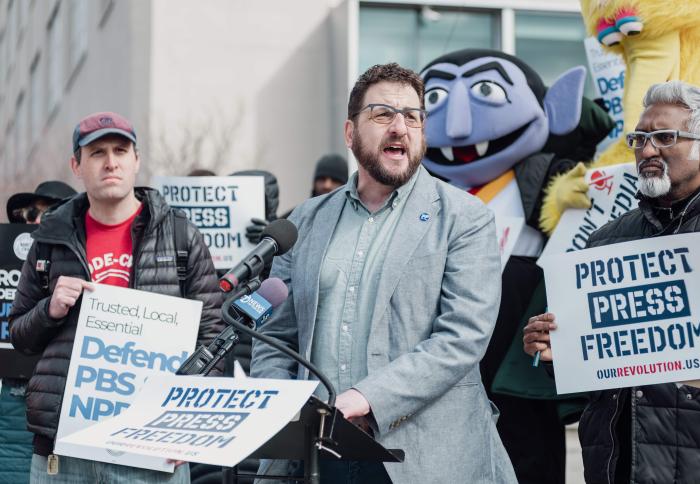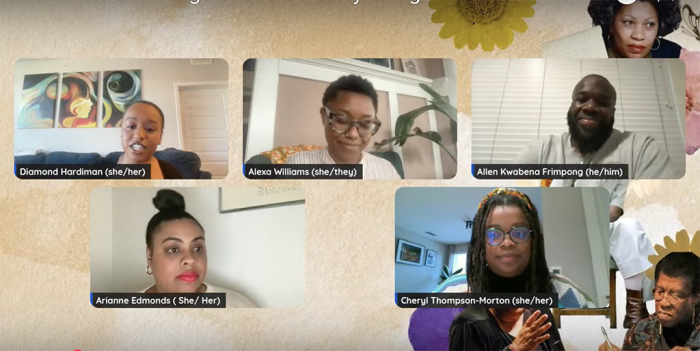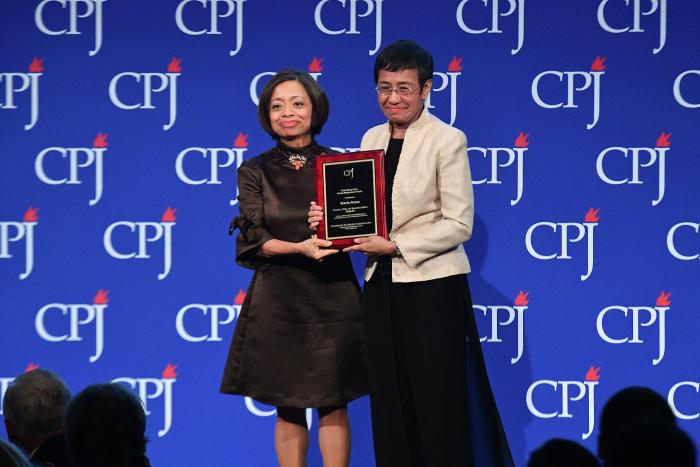Lawmakers, Experts and Advocates Discuss Online Frauds and Scams on Capitol Hill

In March, Free Press Action and the Disinfo Defense League (DDL) held a Capitol Hill briefing with lawmakers, experts and advocates to discuss the harms that privacy violations, digital redlining, hate speech and disinformation pose for communities of color and others who experience online discrimination.
The briefing, titled “A Roadmap for Protecting Digital Civil Rights,” was sponsored by Rep. Yvette Clarke of New York and Sen. Ben Ray Luján of New Mexico and centered on how online disinformation and hate uniquely impact communities of color. The hearing provided a framework of legislative priorities, endorsed by Free Press Action and the DDL, to mitigate discrimination online.
An epidemic of online hate and disinformation
Sen. Luján opened the briefing, noting “how untrustworthy information, unreliable information can take off in a matter of seconds.” He noted that hate and disinformation are “bad in English, [and] worse in non-English languages.”
Luján set the stage for a broader discussion about algorithmic bias, underscoring how the platforms’ business practices incentivize incendiary content. He noted that the more clicks lies get, the more money the platforms can make. The senator closed with a commitment — as chair of the Senate Subcommittee on Communications, Media and Broadband — to work to “make this better” and to “hold folks accountable.”
Free Press Action Co-CEO Jessica J. González moderated the briefing, situating the conversation in how malicious online forces “attempt to undermine democracy, peaceful transitions of power, [and] the right to vote.”
José Muñoz, the deputy communications manager at United We Dream Action, spoke about his Spanish-speaking father, who used Facebook as a way to stay connected to his communities during the COVID-19 pandemic. His father, a frontline worker, didn’t have the privilege of staying home during the height of the pandemic, so it fell on José to “debunk some of the things that he was seeing on Facebook … conspiracy theories about COVID-19 and how it spreads.”
This was not a unique experience: Muñoz cited research that showed that “Spanish-language disinformation [content] lived 70% longer on Facebook or was never taken down.” He closed by emphasizing that this “is not about Facebook alone. There's significant research that shows that Spanish-language disinformation on platforms like YouTube also lacks the same level of content moderation, policy enforcement and scrutiny that it does in English.”
Ranada Robinson, the research director at the New Georgia Project Action Fund, focused on the unique types of election-related disinformation targeted at Black Georgians. She talked about the prevalence of Blackfishing, "where people create accounts purporting they are Black in order to influence the culture, particularly on Twitter."
Robinson also discussed how “more and more Black influencers are pedaling mis- and disinformation, and it's primarily to create a sense of apathy” around the electoral process. This directly disenfranchises Black voters and can have a dramatic impact in pivotal states like Georgia, Robinson noted, where “every single vote counts ... We want people to want to speak up and vote the way that they would want to.” She also discussed how threats of violence are another form of disinformation that affects voters at the polls. “If people think that they are at risk of experiencing violence when they get to the poll[s], of course, they're going to consider staying home.”
Leezel Tanglao, the president of Filipino Young Leaders Program (FYLPRO), also serves as the co-founder and director of its Tayo project, which was launched in October 2020 in response to the proliferation of COVID-19 disinformation in Filipino communities. She explained how the disinformation on social media “was minimizing the seriousness of COVID and later on the efficacy and safety of vaccines, and which divided traditionally close-knit families and concerned relatives facing an uphill battle in persuading their loved ones to take measures designed to keep us all safe.” The Tayo project helped disseminate trustworthy information in a “timely and culturally competent manner” to prevent disinformation narratives from taking root and meet community needs.
She closed with a salient reminder: “tackling misinformation and protecting digital civil rights is everyone's responsibility.”
Yosef Getachew, director of the Media and Democracy Program at Common Cause, closed the briefing by outlining the DDL policy platform — explaining that one of its strengths comes from a focus on the platforms’ business models. “It looks at the ways that our data is being used to target us with harmful content and [how] algorithms are being used to amplify harmful content or create discriminatory practices that lead to harmful outcomes for our communities [and] undermin[e] our civil rights.”
One concrete action that Congress could take, Getachew explained, is introducing and passing comprehensive privacy legislation like he American Data Privacy and Protection Act (ADPPA), which would prevent companies from “collecting our data unless [they] have] a specific purpose or reason to use it.” Getachew also voiced support for legislation that would give researchers access to data and make these company practices more transparent. He also expressed support for the creation of a tax on the platforms that could be used to support journalism.
González closed the briefing with a Q&A session. She crystallized the multiple approaches needed to address these urgent issues. ”We need the government to act right away, but we also need corporate responsibility from these companies, and we have a comprehensive document at ChangeTheTerms.org that lays out our expectations.” González implored Congress and the Federal Trade Commission to act, emphasizing the importance of the stories shared on the panel as an inroad to inform legislation and policymaking. “We should own our data,” she said, “and Congress really needs to act.”





